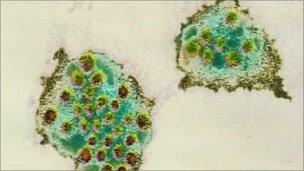Morriston Hospital defends visitor ban over winter bug
- Published

Norovirus is difficult to contain
Managers at a Swansea hospital where seven wards have been shut after an outbreak of the winter vomiting bug say the situation is being handled with sensitivity.
Visitors are being asked to stay away from Morriston Hospital as it tries to contain the norovirus.
But Victoria Franklin said some are being allowed in in "exceptional circumstances".
The director of nursing advised people to phone ahead of going there.
Norovirus is a common viral infection which causes diarrhoea and vomiting, and is easily passed from person to person.
The incubation period is anything from four hours to three days, and symptoms usually last 12 to 60 hours.
Ms Franklin, who is the executive lead for infection prevention and control at the Abertawe Bro Morgannwg University Health Board (ABM), said strict measures had been introduced to control the spread of the bug.
She told BBC Wales "as a precautionary measure what we've had to do to limit the spread of the infection is close a number of our wards".
But she added: "You say that we've banned visitors. Of course we recognise that people wish to see their loved ones and we value visiting as it's a very important part of the healing process
"So what we've actually said is we're asking visitors not to visit Morriston Hospital but where there are exceptional circumstances of course that will be taken into consideration. "
She said: "Because its viral it is very difficult to contain which is why our seven wards where we know that we have norovirus we've actually closed those wards to admissions."
The exceptional circumstances for visitors might included children and people who are nearing the end of their life, said Ms Franklin.
"What we don't want to do is completely ban visiting. We need to deal with this in a very sensitive way," she added.
Ward C, a surgical ward at Morriston, was closed last month to prevent the spread of the bug after six patients had norovirus symptoms.
Tina Donnelly, director of the Royal College of Nursing in Wales, welcomed the measures to control the spread of the norovirus at the hospital
She said: "Once you've got a carrier or somebody who's infected after they've had the initial symptoms they remain infectious for another 48 hours or thereabouts and consequently because its a virus its' very very difficult to contain.
"So what you do want to do is to stop new exposure to vulnerable people and anybody when they are in hospital are extremely vulnerable.
Ms Donnelly said: "We have to be absolutely clear that staff are also vulnerable because when you're dealing with this virus it doesn't stop at patients it transfers to staff as well.
"By curtailing visiting you are trying to contain the infection and by doing that you're making sure that you've got sufficient staff who are not affected to be able to look after those patients as well."
- Published20 December 2010
- Published3 December 2010